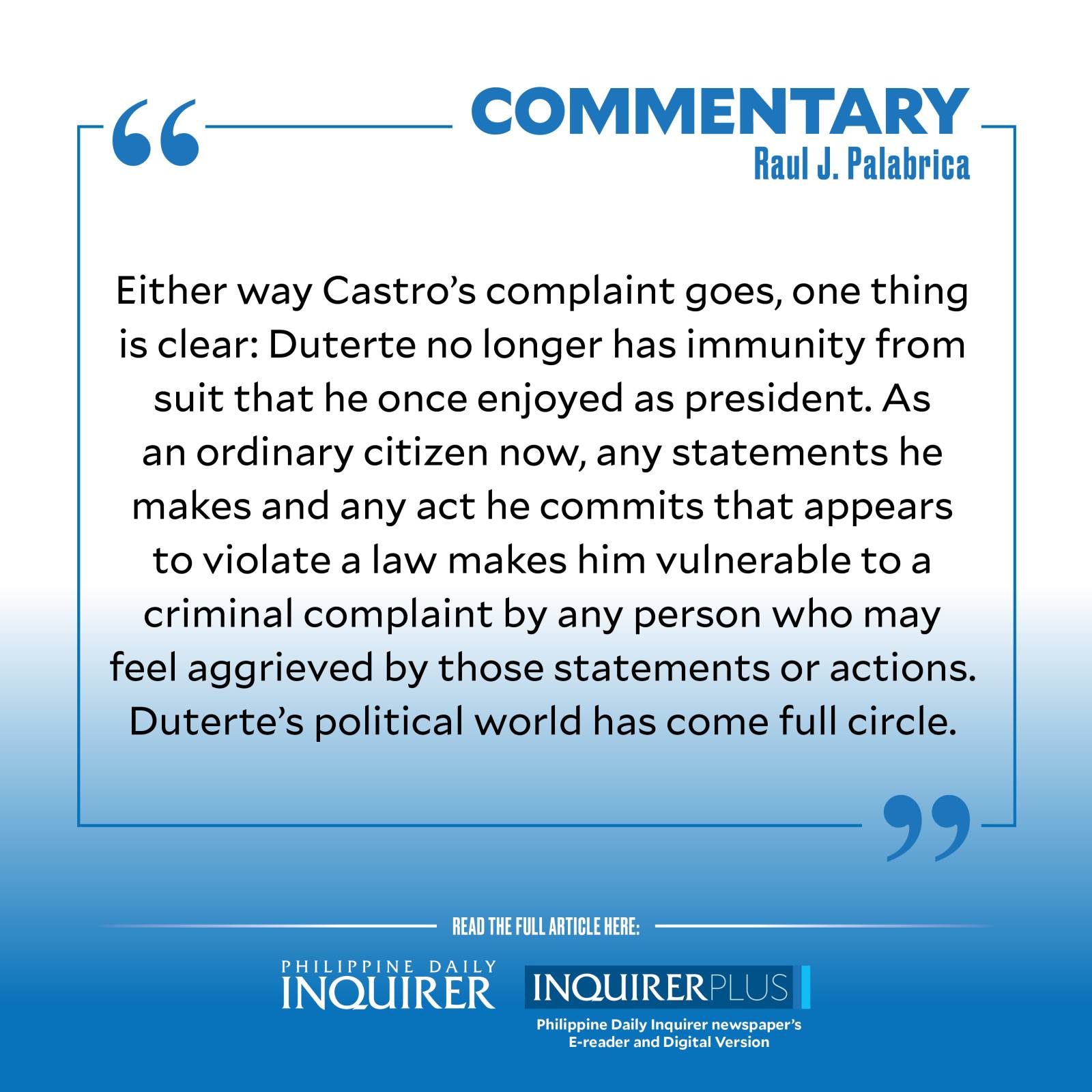Challenges of Duterte crime raps

Former president Rodrigo Duterte cannot be faulted for strongly coming to the defense of his daughter, Vice President and concurrent Education Secretary Sara Duterte, after her request for a huge amount of confidential funds for her department was turned down by the House of Representatives.
Some of those funds were instead allocated to government offices that are engaged in intelligence work.
Article continues after this advertisementAfter six years of being able to get his way in Congress, he probably could not accept that some House members who once kowtowed to his whims would “disrespect” his daughter.
The saying “sic transit gloria mundi” (thus passes the glory of the world) had come to roost and that must have terribly pained him.
But rather than sticking to the issue, Duterte questioned the motives behind the House’s action and threatened to kill Rep. France Castro, the principal critic of the fund request, and her alleged fellow communists.
Article continues after this advertisementIn response, Castro filed a complaint against Duterte at the Quezon City prosecutor’s office for grave threats and commission of a cybercrime.
The crime of grave threats is committed when a person threatens another with the infliction of any wrong amounting to a crime on his or her person, honor, or property.
It does not make a difference if the threat was not pursued or did not materialize for whatever reason. It is enough that a threat had been made.
Depending on the attending circumstances, the offender may be imprisoned for at least six months and ordered to pay a fine of P100,000.
Based on the TV program where Duterte made the threat against Castro, a copy of which she submitted in support of her complaint, there is prima facie (or reasonable) proof that Duterte had committed that crime.Ahead of his reply to the complaint, some of his supporters had said in his defense that his threat should not be taken seriously because it was made in his usual aggressive type of talking and that he was justified in criticizing the people whom he felt had treated his daughter badly on the issue.
Aside from its penal consequences, the complaint has serious political undertones.
If the prosecutor finds merit in it and files it in court, it is not far-fetched that Duterte would view it as a subtle move to undermine his reputation and, indirectly, also that of his daughter whose ambition to succeed President Marcos in 2028 is an open secret.
Note that the popularity (and earlier election) of VP Duterte is attributable principally to her being the daughter and political heir-apparent of the former president. Notice how she hardly uses her married name in public.
It is evident the elder Duterte considers Speaker Martin Romualdez, a cousin and close confidant of Mr. Marcos, as the possible opponent of his daughter in the next presidential election.
For practical political reasons, that’s a prospect that Duterte does not want to happen and would seek to avoid at all costs.
On the other hand, dismissing the complaint for lack of probable cause, or in compliance with the directive of Justice Secretary Jesus Crispin Remulla to file only cases that have strong chances of being upheld by the courts, could be messy.
That may open the Department of Justice, which has supervisory authority over prosecutors, to criticisms of selective justice or giving Duterte a pass for political considerations.
Worse, it may create a precedent for future complaints of grave threats whose underlying circumstances, except for the personalities involved, may be similar to Castro’s complaint. Astute criminal defense lawyers would surely invoke that precedent.
The crime of grave threats has been in the books since the 1930s and the manner by which it should be handled by prosecutors and decided by the courts had been extensively discussed in numerous Supreme Court decisions.
Because of that, prosecutors have to have very good reasons in case they opt to deviate from the guidelines laid down by the high court on the evaluation of that crime.
Although there is no shame in being reversed by a court, prosecutors, as a matter of professional pride, prefer not to be at the receiving end of a judicial rebuke for failure to follow established procedures. More so, if the reprimand is done in public.
Either way, Castro’s complaint goes, one thing is clear: Duterte no longer has immunity from suit that he once enjoyed as president. As an ordinary citizen now, any statements he makes and any act he commits that appears to violate a law makes him vulnerable to a criminal complaint by any person who may feel aggrieved by those statements or actions.
Duterte’s political world has come full circle.
—————-
Comments to rpalabrica@inquirer.com.ph.
















